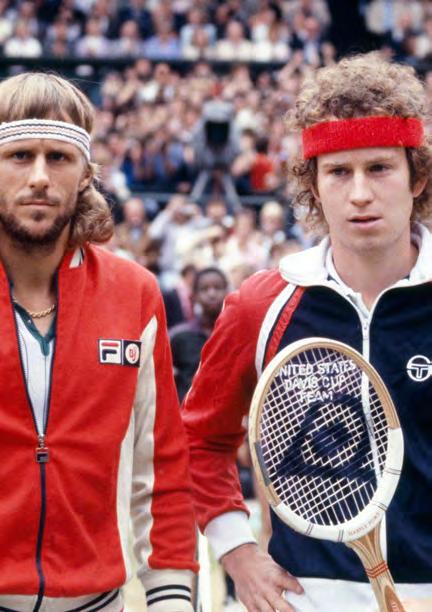
2 minute read
When Wimbledon wonders ruled our summers
The occasional highlights flirtation aside, I stopped watching the tennis from Wimbledon many years ago. Not consciously. It just happened, a bit like how many people stopped watching the snooker over the years. What causes this unforeseen distancing from that which we loved so much in our youth? It must have to do with getting older, although that doesn’t explain why I still follow soccer and GAA with huge interest.
Maybe it’s just down to not having as much free time as we once had. There aren’t enough hours in our busy lives now to facilitate spending long balmy days watching live tennis on TV, however gripping it promises to be.
Advertisement
I fell in love with Wimbledon around 1980. A young teenager then, I could bask in late afternoon/ evening BBC coverage of the sporting drama that played out over a fortnight in the historic All England Lawn Tennis and Croquet Club.
An early favourite for me was Ilie Năstase. The eccentric Romanian genius thrilled fans with his sense of fun, while also being the bane of the authorities. This was Alex Higgins with a racket.
Perhaps oddly (given his Irish ancestry), I was a bit indifferent to John McEnroe. Certainly I was drawn to the man the tabloids gleefully labelled Superbrat, but I couldn’t quite warm to him, probably because of the sheer surliness that underpinned so many of his outbursts. But he was gifted, and tremendously exciting. Box office. You didn’t want to miss a McEnroe game, not least for that confrontational behaviour.
Jimmy Connors wasn’t much further up the likeability scale, but he was darkly charismatic – a dynamic, all-action player with a distinctive grunt at the end of every return. Just about every young Irish boy had a crush on Chris Evert, the unofficial pin-up girl of world tennis in those days. A multiple champion, she won 18 Grand Slams, as did her nemesis, the great Martina Navratilova. Martina was a phenomenon. It was easy to respect her, maybe a bit harder to love her; like snooker’s Steve Davis, she seemed to win too often.
Boris Becker and Pat Cash thrilled us. Pete Sampras emerged as a serial winner. Boris Becker electrified the sport. But for me, one man stood apart. The first time I saw him, I was hooked. Björn Borg. A sporting God, he was charismatic despite – maybe because of – his quiet presence, and icy cool demeanour.
The 1980 final was like nothing we had ever witnessed in sport. Borg v McEnroe, a classic duel forever immortalised by a marathon tie-break. I was ecstatic when Borg prevailed, winning his fifth Wimbledon title in a row. I thought he was unbeatable. But even the greatest champions are shadowed by worthy pretenders. The following year, McEnroe came of age, taking the crown from a devastated Borg, who within weeks stunned the sporting world by retiring, aged just 26.
In latter decades, I’ve cast a glance on the Centre Court from time to time, enjoying the feats of great champions of the modern era (even if the monotonous power-serving big-hitters became a turn-off). It all began again last Monday. Second serve. Quiet please. Deuce. Game, set and match. I recognise hardly any of the top players now. But I’m hoping to reconnect, at least via the nightly highlights programmes.
Wimbledon is one of the sporting highlights of every year, a symbol of summer too, not least for the quaint devotion to strawberries and cream, a gesture towards tradition and nostalgia. Every year, a new story reveals itself, hour by hour, stroke by stroke. It’s the epic sporting soap opera that was undeserving of our mid-life indifference.










